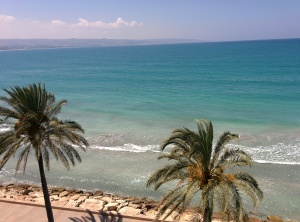Last week, the Lebanon Minister of Environment, Mohammed Machnouk, announced the preliminary results of an assessment study on the impact of the war in Syria on Lebanon’s environment. The study estimates that by the end of 2014, the influx of refugees from the Syrian crisis will have increased water consumption at the national level between 8% and 12%. Solid waste generated by the refugees is expected to reach 324,000 tons by then, which is equivalent to 15.7% of the total amount of waste produced in Lebanon prior to the arrival of the refugees. This increase will have adverse impacts on water resources and air quality. Continue reading
Monthly Archives: July 2014
The Lebanese government can’t even protect a few trees
The Municipality of Saida has taken legal action against a number of individuals for repeatedly cutting down old trees despite numerous warnings. A few residents complained to the municipality that a landowner and a number of workers were cutting down trees on a pavement. The Mayor of Sidon Mohammmad Saudi said that the police patrol that followed up on the complaints managed to confiscate the equipped used to chop the tree. However, this did not stop the perpetrator who continued to cut down all trees and was able to get a local influential group to intervene and drop the charges against him. Continue reading
Should Lebanon declare a state of water emergency?
Last week, Mohammad Qabbani, the head of the parliamentary committee on water, called for a state of water emergency. Qabbani stressed the need to set water-usage guidelines to help Lebanon cope with the extreme shortage expected this summer. According to one of the MPs in the committee, “In August, we will have run out of water, especially in Beirut.” Qabbani argued the need to put privately owned wells under the control of public water institutions, importing water from turkey, limiting the use of water for cleaning of streets and washing cars, and halting irrigation of seasonal crops while compensating the farmers to conserve it for domestic use. Continue reading
Sidon bids farewell to “Garbage Mountain”
Last year, Sidon Municipality, with support from the Ministry of Environment and the United Nations Development Programme, embarked on a project that would get rid of its infamous garbage mountain, aiming to replace it with a 35,000 square meter park. The land had been used as a dump site since 1982 and received about 300 tons of waste a day until it became the great eye sore of the coast of Sidon. Continue reading
Are Lebanon’s beaches clean?
Since 2005, the Environment and Development magazine has been monitoring water quality along the Lebanese coast for fecal coliform, which is an indicator that raw sewage is being discharged in the vicinity. These results are published every year to inform the public and help them decide on the upcoming season’s swimming destination. Dr Ghabi Khalaf, director of the National Center for Marine Science, who also perform similar monitoring, explained that the results may differ from month to month or even day to day because of the wastewater flow and other factors such as wind speed. Continue reading





